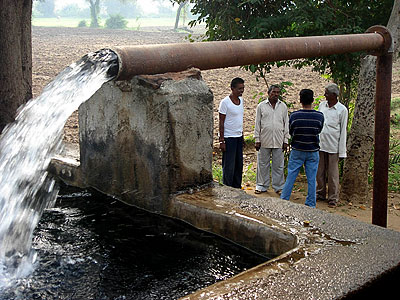- ON THE DECADE
- THE DECADE'S CAMPAIGN
- REPORTING ON PROGRESS
- THE DECADE'S PROGRAMMES
- FOCUS AREAS
-
- Access to sanitation
- Financing water
- Gender and water
- Human right to water
- Integrated Water Resources Management
- Transboundary waters
- Water and cities
- Water and energy
- Water and food security
- Water and sustainable development
- Water and the green economy
- Water cooperation
- Water quality
- Water scarcity
- FOCUS REGIONS
- RESOURCES FOR
- UN e-RESOURCES
Water for Life Voices
Knowledge Bank. IWMI-Tata Water Policy Program, India
Organization: IWMI-Tata Water Policy Program (ITP)

IWMI-Tata Water Policy Program (ITP) was initiated in 2001 as a co-equal partnership between the International Water Management Institute (IWMI), Colombo, and Sir Ratan Tata Trust (SRTT), Mumbai. ITP is an international scientific institute which has focused on developing ideas for co-management of energy and groundwater (Energy-Irrigation Nexus), a key facet of agriculture in India.
Here ITP recommended that a plan to create a USD 120 million pipeline to water scarce areas was scrapped. Instead, in 2005-2006, the Government of Gujarat launched the Jyotirgram Yojana (JGY) programme and spent USD 250 million to completely re-wire the state. Today the new set up provides a daily separate source of eight hours of uninterrupted power just for agriculture.
ITP put expert observers on the ground. They found that Indian agriculture didn’t need optimal solutions – merely practical ones. For example, they found that where groundwater was excellent but electrical power was unavailable, expensive diesel was pushing up the cost of production. Meanwhile in water scarce areas with extensive power, wasteful electrical practices and the cost of transporting water also increased costs.
This is just one instance of how ITP showed that despite a lot of potentially useful scientific research being conducted in India, it often does not reach the policy makers – who are willing and keen to learn from science – because neither the research objectives nor the research design are formulated with them in mind.
By providing regular and reliable power, JGY made it possible for farmers to keep to their irrigation schedules, conserve water, save on pump maintenance costs, use labour more efficiently and expand their irrigated agriculture rapidly. While GDP from agriculture grew at just under 3 percent per annum for India as a whole, Gujarat has recorded nearly 10 percent growth since the project’s inception in 2003, the highest in India. The scheme has been so successful the government of India has made it a flagship scheme in its 12th five-year plan for the power sector.
ITP has shown how an international scientific institute working as equal partner with an Indian donor can set the agenda for discussion, debate and policy action around India’s future of water and agriculture.
Keywords: access to water, food security , sustainable development.
Location: India, Asia and the Pacific
Corresponding websites:
>> More information about the initiative
>> Applying Contingency Theory to Irrigation System Management in India
>> Intro
>> Progress
>> Pride
>> Hope
>> Your Voice
>> End
>> Full Exhibition
>> Ecosystems
>> Empowering communities
>> Food security
>> Gender and water
>> Groundwater
>> Hygiene
>> Open defecation
>> Participation
>> Sustainable development
>> Water and culture
>> Water and disasters
>> Water and energy
>> Water and health
>> Water for cities
>> Water efficiency
>> Water quality
>> Water scarcity
>> Voices of experts
>> Voices from business
>> Voices from the civil society
>> Voices from the field: case studies
>> Africa
>> Asia and the Pacific
>> Europe
>> Latin America and the Caribbean
>> Middle East
>> Oceania
>> Decade’s achievements. From MDGs to SDGs
>> Five years of UN-Water "Water for Life"
Awards 2011-2015
>> Water for Life Voices
Copyright | Terms of use | Privacy notice | Site Index | Fraud alert | Help




